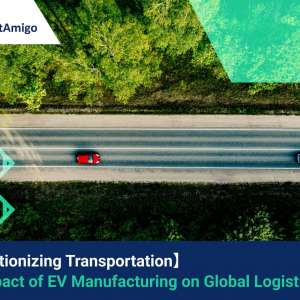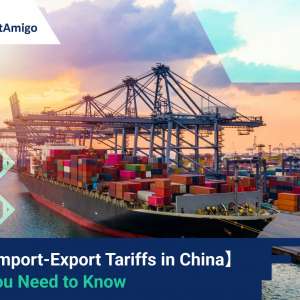In today’s world, where the effects of climate change are becoming increasingly evident, the need for sustainable solutions is more pressing than ever. One area that has gained significant attention is transportation, which is responsible for a significant portion of greenhouse gas emissions. As a result, the concept of green transportation has emerged as a viable solution to reduce the carbon footprint associated with logistics. Green transportation refers to the use of environmentally friendly modes of transport that minimize pollution and promote sustainability.
Author Name:Tiffany Lee – Marketing Analyst at FreightAmigo
Want to compare the best Express, Air Freight, Sea Freight, Rail Freight & Trucking rates so as to have better control on cost?
The Importance of Sustainable Transportation
The importance of sustainable transportation cannot be overstated. With the global population on the rise and urban areas becoming more congested, traditional modes of transport have proven to be inefficient, contributing to pollution and traffic congestion. Sustainable transportation aims to address these challenges by promoting modes of transport that are energy efficient, minimize emissions, and reduce reliance on fossil fuels. By adopting sustainable transportation practices, not only can we mitigate the adverse effects of climate change, but we can also improve air quality, enhance public health, and promote social equity.
Benefits of Green Transportation in Low-Carbon Logistics
Implementing green transportation practices in low-carbon logistics offers a multitude of benefits. Firstly, it significantly reduces greenhouse gas emissions, helping to combat climate change. By replacing traditional vehicles with electric or hybrid alternatives, emissions can be reduced by a substantial amount. Additionally, green transportation can lead to cost savings in the long run. While the initial investment may be higher, the lower operational costs and reduced maintenance requirements make it a financially viable option. Furthermore, green transportation can improve the overall efficiency of logistics operations. By optimizing routes and utilizing technologies such as telematics, fuel consumption can be minimized, resulting in higher productivity and reduced delivery times.
Sustainable Transportation Solutions
Several sustainable transportation solutions are available to address the challenges faced by the logistics industry. One such solution is the use of electric vehicles (EVs) for transportation purposes. EVs produce zero tailpipe emissions, thereby reducing air pollution and dependence on fossil fuels. Additionally, the development of charging infrastructure has made EVs a practical option for transportation companies. Another solution is the utilization of alternative fuels such as biofuels and hydrogen. These fuels are renewable and emit fewer greenhouse gases compared to traditional gasoline or diesel. Furthermore, investing in public transportation and promoting active modes of transport such as cycling and walking can reduce the number of private vehicles on the road, leading to decreased congestion and emissions.
Examples of Eco-Friendly Transport Options
There are numerous examples of eco-friendly transport options available today. One prominent example is the use of electric buses in urban areas. By electrifying public transportation, cities can significantly reduce emissions and improve air quality for their residents. Another example is the implementation of bike-sharing programs. These programs encourage individuals to use bicycles for short-distance travel, reducing the need for car usage. Additionally, companies are experimenting with innovative solutions such as drone delivery and autonomous vehicles to further reduce emissions and increase efficiency in logistics operations.
Challenges and Barriers to Implementing Sustainable Transport
While the benefits of green transportation are evident, there are several challenges and barriers that hinder its widespread implementation. One major challenge is the high upfront cost of adopting sustainable transportation solutions. Electric vehicles, for instance, are more expensive than their conventional counterparts, making it difficult for some companies to make the initial investment. Another barrier is the lack of charging infrastructure for electric vehicles. Without a robust network of charging stations, the adoption of EVs may be limited. Additionally, resistance from stakeholders, including consumers and industry players, can pose a challenge to the widespread adoption of sustainable transport practices. Overcoming these challenges will require collaboration between governments, businesses, and individuals to create an enabling environment for sustainable transportation.
The Future of Green Transportation
The future of green transportation looks promising. Governments around the world are increasingly recognizing the importance of sustainable transportation and implementing policies to promote its adoption. The advancement of technology is also driving innovation in the transportation sector. The development of more efficient batteries, improvements in charging infrastructure, and the emergence of autonomous vehicles are just a few examples of how technology is shaping the future of transportation. Furthermore, consumer preferences are shifting towards eco-friendly options, putting pressure on companies to embrace sustainable practices. As these trends continue to evolve, green transportation is poised to play a significant role in shaping a sustainable future.
Moving towards a Sustainable Future
In conclusion, green transportation is a crucial component of low-carbon logistics and plays a vital role in driving towards a sustainable future. By adopting sustainable transportation solutions, we can reduce emissions, improve air quality, and enhance the efficiency of logistics operations. Although there are challenges and barriers to overcome, the benefits of green transportation far outweigh the costs. With the support of governments, businesses, and individuals, we can create an environment that fosters the widespread adoption of sustainable transport practices. Together, we can pave the way for a greener, cleaner, and more sustainable future.
There are different options for cargo transportation. If you want to choose the most convenient and suitable solution, it is best to have the full support of logistics experts! If you are planning to ship goods overseas, please go to the FreightAmigo page for inquiries.
===
Read More:
【Logistics 101】What is Delivery Schedule and How it Works?
Green Procurement: A Sustainable Approach to Purchasing
===
If you have any inquiries on logistics/supply chain, feel free to contact FreightAmigo now:
Chat with us online OR
Phone : +852 28121686
WhatsApp: +852 27467829



